Latest News
Gazans bombarded by Israel have no hope and no escape
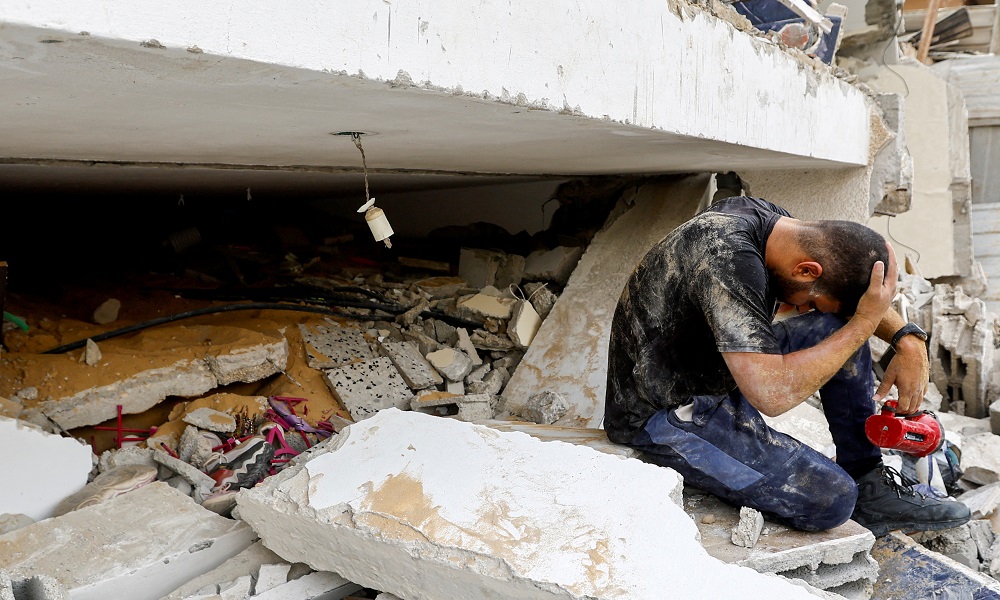
Most of the 2.3 million people in the Gaza Strip have no electricity and no water. And, with hundreds of Israeli strikes raining down on their tiny enclave, they have nowhere to run.
The Palestinian territory, one of the most crowded places on Earth, has been under siege since Saturday in a near-constant bombardment that Gazan health officials say has killed more than 1,000 people. The blitz is retaliation for a devastating attack on Israel by Gaza’s ruling group Hamas which the Israeli military says killed more than 1,200 people, Reuters reported.
Gaza’s sole power station, which had been working intermittently for days, cut out on Wednesday after running out of fuel. Without power, water can’t be pumped into houses. At night there’s nearly total darkness punctuated by fireballs and the pin-pricks of light from phones used as flashlights.
“I lived through all the wars and incursions in the past, but I have never witnessed anything worse than this war,” said Yamen Hamad, 35, a father-of-four, whose home had been destroyed by Israeli strikes on the northern Gaza town of Beit Hanoun.
At a hospital in Khan Younis in southern Gaza, relatives and friends lined up outside the overloaded morgue where bodies were laid out on the floor because coolers were full or had no power.
The mourners were desperate to bury their loved ones swiftly before the unseasonable heat took its toll. They spoke briefly over the bodies, praying for the souls to rest in peace, before they carried them to graves nearby, with stretchers if they were available, or otherwise without.
Reuters interviewed more than three dozen people in Gaza, and most echoed Hamad’s sentiments. They painted a picture of dread and hopelessness in the face of what they described as the worst violence they’d ever seen.
With the strip’s only other border, to Egypt, blocked by Egyptian authorities, the people said they were trapped. They feared the worst was yet to come, including a possible ground invasion, as Israel seeks retribution for the deadliest Palestinian militant attack in the country’s 75-year history.
That surprise raid, launched on Saturday, saw Hamas militants burst out of Gaza and kill hundreds of people, leaving corpses strewn around a music festival and a kibbutz community. Scores of Israelis and others have been taken to Gaza as hostages, some paraded through the streets.
The Hamas attack drew strong condemnation by the United States and other Western governments. The militant group’s 1988 founding charter called for Israel’s destruction, and the group is branded a terrorist organization by Israel, the United States, the European Union, Canada, Egypt and Japan.
Israeli Defence Minister Yoav Gallant has pledged to intensify the military campaign in Gaza, saying on Wednesday that Israel would wipe Hamas “off the face of the Earth”.
Beit Hanoun, near the frontier with Israel, was among the first places hit hard by retaliatory Israeli strikes, with many roads and buildings destroyed and thousands of displaced, according to Hamas and local residents.
There was no escape for Ala al-Kafarneh’s family.
The 31-year-old said he fled the town on Saturday with his pregnant wife, his father, brothers, cousins and in-laws. They drove to Beach Refugee Camp on the coast, where they hoped they would be safer, but air attacks began targeting that area too so they headed to Sheikh Radwan, another district deeper east.
On Tuesday night, an airstrike hit the building where Kafarneh and his family were sheltering, killing all of them except him, he added.
“We escaped from danger into death,” Kafarneh said outside the Shifa hospital in Gaza City, his head cut and a plaster cast running from his shoulder to his wrist. He was sitting on a pavement near hundreds of other people living in the open next to the hospital. Some said they hoped that its presence might offer them some protection from the bombardment.
“I’m homeless now,” said Youssef Dayer, 45, sitting on the ground by the hospital. “Maybe it’s safe. Maybe. It’s a peaceful civilian place, right? Maybe not. Nowhere seems safe,” he added.
Some people outside the hospital had brought blankets or strips of cardboard to sleep on, others had flung themselves straight down onto the bare ground. There were long queues for people to use the few toilets inside the hospital.
More than 175,000 Gazans have fled their homes since Saturday, according to the United Nations. Some aid agencies in Gaza say the conditions are the worst they can remember even after repeated conflicts and 16 years of an Israeli blockade since Hamas took power there in 2007 following a brief civil war with forces loyal to Palestinian President Mahmoud Abbas’ Fatah faction.
“The civilian loss this time … is unprecedented,” said Hisham Muhanna, spokesperson for the International Committee of the Red Cross in Gaza.
At another hospital, Medecins Sans Frontiers doctor Mohammad Abu Mughaseeb said medical supplies had been lacking for years. The intensified Israeli siege meant fast-dwindling stocks would run out in weeks, he said.
“If things continue like this for a few days the health system will collapse,” he said after sleeping at the hospital because his own home had been damaged in a blast.
The lack of electricity has cut off much of the enclave’s water supply. Men and boys stood near one of the few supplies in Khan Younis loading huge tanks onto three-wheeled rickshaws, carts they dragged by hand and a small wagon pulled by a horse.
The Gazan health ministry said hospitals and other medical facilities running on fuel generators were expected to run out of power in the next few days. The ministry said it feared that sewage treatment facilities would also come to a halt, leading to growing waste and disease across the territory.
Hamas, as the de facto government of the Gaza Strip, runs the police, hospitals, ambulance service, plus the civil emergency department.
U.N. schools have become the main places of shelter for Gazans who have fled their homes, with families crowded into classrooms, some sleeping on mattresses others on blankets.
At one school in Gaza City, the sound of blasts frightened the children, keeping them and their parents awake. Many people sat outside in the open, scared they’ll be buried by airstrikes that pancake concrete buildings.
In Khan Younis, an ambulance stood at the end of an alleyway with its siren blaring, a man sat inside cradling his young daughter, their eyes staring wide from faces covered in dust. “Don’t be scared, don’t be scared,” he whispered over and over.
Latest News
Turkish intelligence captures a Daesh member near the Durand Line
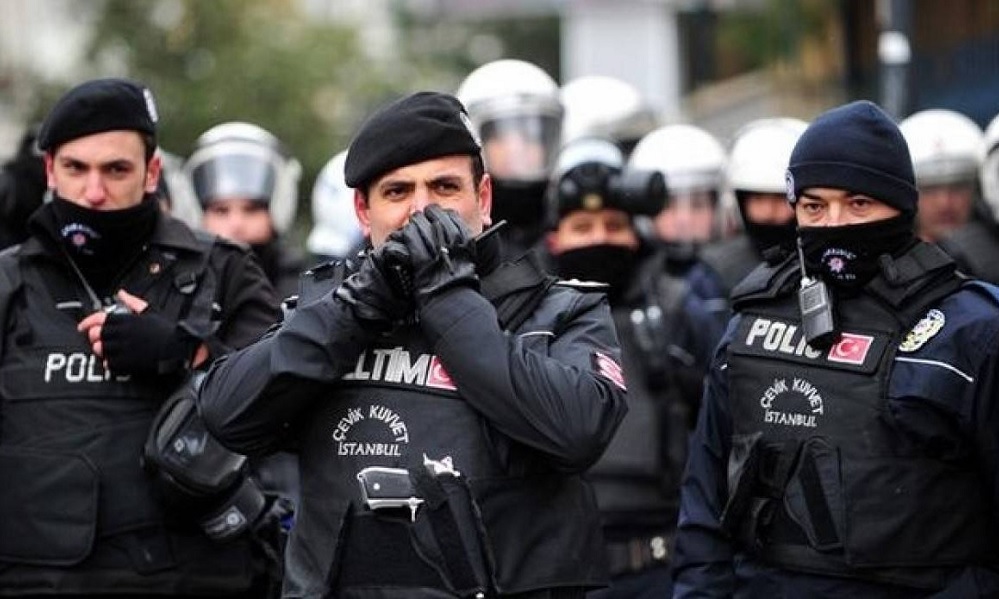
Turkish intelligence agents have captured a senior member of Daesh near the Durand Line, reportedly preventing planned suicide attacks in Turkey and other countries, according to Turkey’s state-run Anadolu Agency on Monday.
The suspect, identified as Mehmet Goren, is a Turkish citizen. He was apprehended during a covert operation and transferred to Turkey. Details on the timing of the operation or the involvement of Afghan and Pakistani authorities were not disclosed.
According to the report, Goren had risen through the ranks of Daesh and was allegedly tasked with carrying out suicide bombings in Turkey, Pakistan, Afghanistan, and Europe.
Daesh has a history of deadly attacks in Turkey, including the January 1, 2017 shooting at an Istanbul nightclub that killed 39 people.
Anadolu Agency reported that Goren’s arrest also provided intelligence on the group’s recruitment strategies and planned activities.
Latest News
Dozens of needy families in Kabul receive winter aid from Bayat Foundation
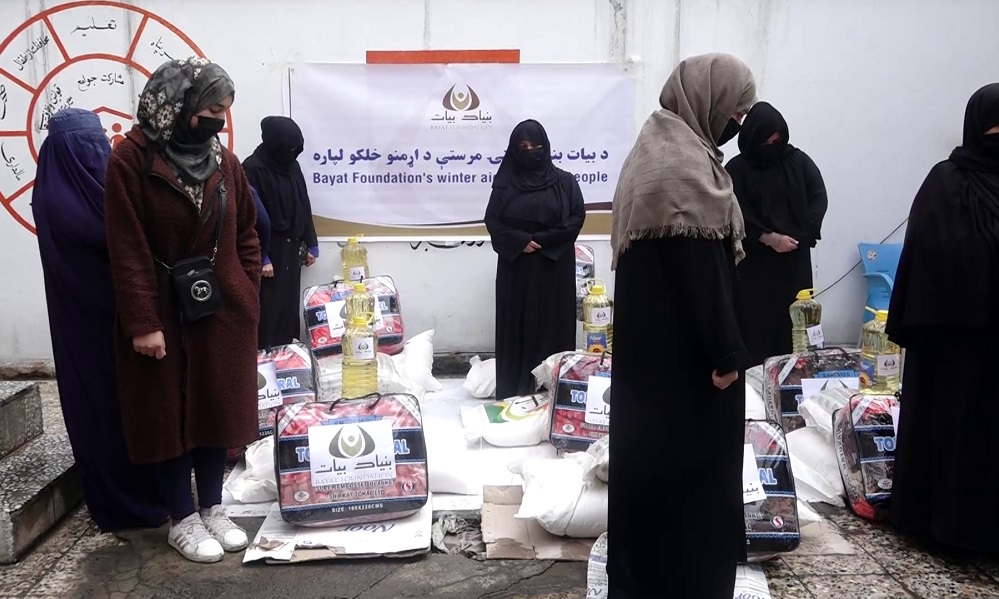
Dozens of needy families in Kabul’s fifth district have received essential winter assistance from the Bayat Foundation, as part of ongoing efforts to ease hardship during the cold season and worsening economic conditions.
According to foundation officials, the aid package includes staple food items such as flour, rice, and cooking oil, along with warm blankets to help families cope with freezing temperatures. Haji Mohammad Ismail, Deputy Head of Bayat Foundation, said the distribution began in Kabul and will soon be expanded to other provinces.
“Our assistance includes flour, rice, cooking oil, and blankets,” Ismail said. “Today, we started distributing these items in Kabul’s fifth district, and God willing, the aid will reach other provinces in the near future.”
Afghanistan continues to face widespread poverty, unemployment, and food insecurity, with many families struggling to meet basic needs, particularly during winter when access to work and heating becomes more difficult.Humanitarian organizations and charitable foundations have stepped up relief efforts to support those most affected.
Beneficiaries welcomed the assistance, describing it as a lifeline. “May God bless you for helping the poor. We had nothing and no work,” said one recipient. Another added, “Thank you for your help. Our flour was almost finished.”
Bayat Foundation officials stressed that winter aid distributions will continue in Kabul and other provinces in the coming days, as part of their broader commitment to supporting needy families across the country.
Latest News
Nearly seven million Afghan refugees return home since Islamic Emirate’s takeover
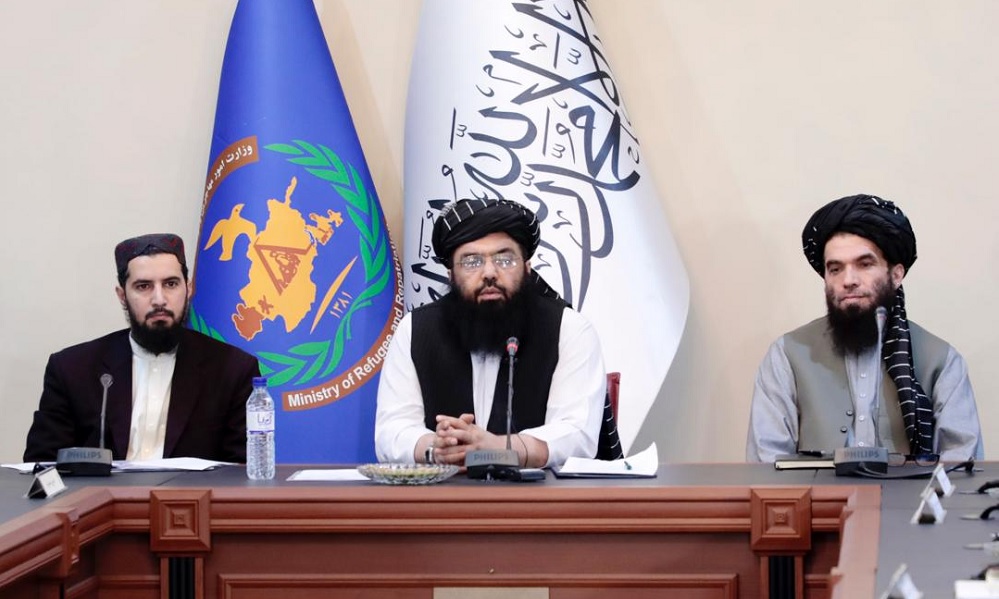
Since the Islamic Emirate came to power, approximately 6.8 million Afghans have returned home, either voluntarily or forcibly, from neighboring countries and other nations, according to the Minister of Refugees and Repatriation.
Mawlawi Abdul Kabir, speaking at a meeting on finalizing a draft plan for a permanent migration solution in Afghanistan, added that 1.3 million Afghans have been internally displaced due to natural disasters during the same period.
With winter approaching, widespread poverty and severe cold are threatening thousands of lives. Meanwhile, the forced expulsion of Afghan migrants from neighboring countries, particularly Iran and Pakistan, continues.
The Islamic Emirate has repeatedly urged neighboring states to allow migrants to return voluntarily. According to UNHCR, over two million Afghans have returned from Iran and Pakistan since the start of 2025.
-

 Latest News2 days ago
Latest News2 days agoAfghanistan signs 30-year deal for marble mining in Daikundi
-

 Latest News4 days ago
Latest News4 days agoAfghan border forces prevent illegal entry of hundreds into Iran
-

 Latest News3 days ago
Latest News3 days agoPakistan summons Afghan diplomat over deadly attack in North Waziristan
-

 Latest News3 days ago
Latest News3 days agoAfghan health minister calls for medical cooperation between Kabul and New Delhi
-

 Latest News4 days ago
Latest News4 days agoJapan allocates nearly $20 million in humanitarian aid for Afghanistan
-

 Latest News3 days ago
Latest News3 days agoKarzai urges reopening of girls’ schools and universities for Afghanistan’s bright future
-

 Health5 days ago
Health5 days agoAfghanistan seeks India’s support in standardizing traditional medicine
-
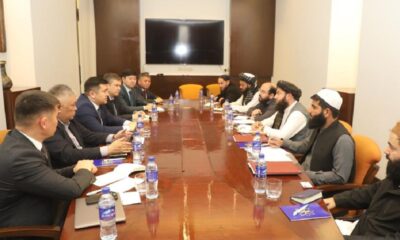
 Business5 days ago
Business5 days agoAfghanistan-Kazakhstan banking ties discussed in Kabul meeting
























